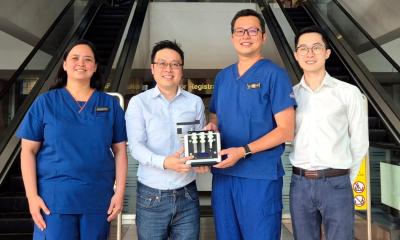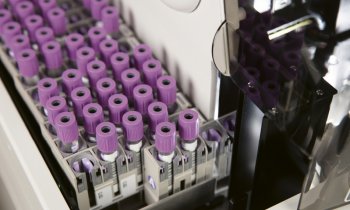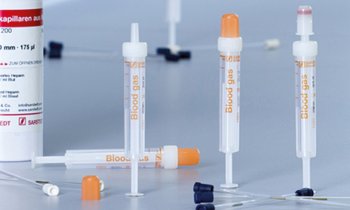News • Blood poisoning
Sepsis: 5-country survey shows lack of public awareness
On World Sepsis Day, in vitro diagnostics company bioMérieux and the UK Sepsis Trust reveal the results of a survey conducted in Europe regarding knowledge and attitudes towards sepsis.
The findings demonstrate the need to accelerate awareness and education of the general population about this life-threatening condition. Sepsis is a life-threatening organ dysfunction caused by an excessive immune response to a serious infection. Every year worldwide 49 million people develop sepsis, of whom 11 million do not survive.
The results of the survey can be accessed via the bioMérieux website.

Image sources: Rob984, Europe orthographic Caucasus Urals boundary (with borders), CC0 1.0 / Shutterstock/Phonlamai Photo, Mashup by HiE/Behrends
The survey in five European countries (UK, Germany, France, Sweden, Italy)* to better understand awareness, attitudes and expectations of the general population vis à vis sepsis. The main findings of this survey can be summarized as below:
- Knowledge of the term “sepsis” is low among the surveyed general adult population. Only 52% have heard of sepsis, the lowest awareness in comparison to other listed conditions. Awareness of sepsis varies greatly between countries: it is highest in the UK (82%) and Germany (83%), it is lower in Sweden (55%), and significantly lower in Italy (33%) and France (7%).
- Moreover, only 56% of those aware of sepsis know at least one of the listed symptoms of sepsis, among which the most frequent are: lack of energy and being difficult to wake (29%), mottled or discolored skin (26%), and bluish or pale skin (24%). Awareness of symptoms is higher in the UK and in adults under the age of 40.
- Only 29% of surveyed adults stated that they are personally concerned about getting sepsis. Among those who had heard of Sepsis, if they were with someone who was worried they had this condition, only two thirds (66%) would either go to the emergency department or call an emergency line, which is the right behaviour in such a situation.
Dr Ron Daniels BEM, Chief Executive and founder, UK Sepsis Trust declared: "For a condition which is responsible for 1 in 5 deaths worldwide, these important results highlight significant issues with regard to awareness of sepsis in some countries. They demonstrate that there is huge geographical variation and that, in a decision which could literally make the difference between life and death, one in three adults would still respond inappropriately. We call on all European governments to prioritize sepsis awareness, particularly relevant as we emerge from the Covid-19 pandemic.”
Diagnostics are key tools to allow the clinician to diagnose sepsis and the related infection, to adapt antimicrobial treatment and to manage organ failures
Mark Miller
From a list of actions, surveyed adults are most likely to agree that the following would improve the management of sepsis and the problem of antimicrobial resistance: more education for the general public on early sepsis symptoms (78%), better access to easy-to-understand information about sepsis (75%), and faster diagnostic tools that can be used to confirm sepsis (75%).
Mark Miller, Executive Vice President, Chief Medical Officer, bioMérieux explained: “This survey shows the need for both awareness and timely diagnostics to combat sepsis. Diagnostics are key tools to allow the clinician to diagnose sepsis and the related infection, to adapt antimicrobial treatment and to manage organ failures.”
Despite sepsis having such a large global impact and mortality rate, general awareness of the condition is low on average in Europe. These results only reinforce our conviction and commitment to greater education and awareness in the fight against sepsis. It also calls for a stronger commitment of public authorities, civil society as well as healthcare industries in order to address this major health issue and help end preventable deaths.
*On behalf of bioMérieux and The UK Sepsis Trust, Ipsos MORI UK Ltd conducted an online survey among a representative sample of 7,701 adults aged 18+ across 5 countries (UK n=1,549, France n=1,509, Germany n=1,515, Sweden n=1,613, Italy n=1,515) between 1st June and 22nd June 2021. To identify a representative sample of adults aged 18+, quotas were set by age within gender, geographic area of residence, level of education and work status. Weighting has been applied to bring the sample in line with the known population profile of these audiences. The overall total results are based on country averages across the five countries and each country was weighted equally.
Source: bioMérieux
13.09.2021











